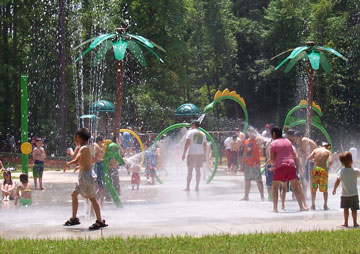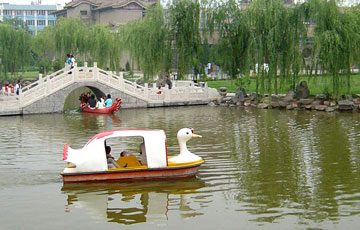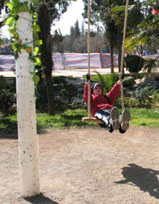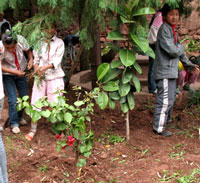Mindyburg Paradise Park
A parable
©Michael Krigline, MA
(July 2007) www.krigline.com
Click here for a discussion
version of this story (especially for English-learners)
 Mr.
Ian Goode was a wealthy young man who owned a valuable tract of land near
the center of Mindyburg. He lived in a different place, so he decided to
dedicate this property to the enjoyment of Mindyburg’s residents. Mr.
Goode hired a team to create and construct a beautiful park on about a
third of the land, around a refreshing spring. Citizens could drink the
cool water, and children could play in a water-playground he also
constructed. There were many shady trees, a large green lawn, benches, a
playground, a big sandbox, and everything else you could hope for in a
small park. He left the rest of the property undeveloped, and hoped that
his example would stir the local people who enjoyed the park to add to it
as their resources allowed.
Mr.
Ian Goode was a wealthy young man who owned a valuable tract of land near
the center of Mindyburg. He lived in a different place, so he decided to
dedicate this property to the enjoyment of Mindyburg’s residents. Mr.
Goode hired a team to create and construct a beautiful park on about a
third of the land, around a refreshing spring. Citizens could drink the
cool water, and children could play in a water-playground he also
constructed. There were many shady trees, a large green lawn, benches, a
playground, a big sandbox, and everything else you could hope for in a
small park. He left the rest of the property undeveloped, and hoped that
his example would stir the local people who enjoyed the park to add to it
as their resources allowed.
Mr. Goode also hired a
local law firm to draw up some basic rules for the property. First, while
structures could be built on the property, they must be used for the good
of the people. Second, the property was to remain mostly “green space,”
not primarily buildings. Third, there was never to be any charge for
admission or anything else used or distributed on the property. Everything
could be enjoyed by rich and poor alike, so long as they were wearing a
button that said “Have a Goode Day!” These buttons would always be
available for free from the law firm. Fourth, although he expected the
local citizens and businesses to voluntarily provide for the park’s
upkeep, Mr. Goode told the law firm that if his financial help was ever
truly needed they just needed to inform him in writing. Fifth, while he
didn’t expect any return on his investment and didn’t intend to oversee
every change made in coming years, he retained the rights to the property,
including the indisputable right to empower his local law firm to enforce
these basic rules. The rules were posted in several places within the
park, and also in a mini-garden outside the park’s only entrance. Written
copies were also available from the law firm upon request.
The townspeople were
thrilled about this man’s generosity, and they loved their new park. At
the entrance, they put up a big sign that said “Mindyburg Paradise Park;
Have a Goode Day!” The law firm also staffed a booth next to the entrance,
giving out “Have a Goode Day” buttons to anyone who wanted to enter the
park. The people of Mindyburg faithfully wore their “Goode Day” buttons
whenever they visited the park—mainly to show their deep gratitude, for no
one guarded the entrance or enforced this rule. The people also declared
the 15th of each month to be “Goode Appreciation Day.” On the
15th,
people within blocks of the park decorated their homes and businesses with
flowers, and everyone exchanged the greeting: “Have a Goode day!” On the
anniversary of the park’s grand opening, they also held a parade, and (for
many years) unveiled some addition to the park. The first year, it was a
free “green” parking lot, made of those special bricks that grass could
grow through. The second year, they added a shelter near the spring, where
people could get free cups of refreshing water, and gather for picnics
even in the rain.
For about a decade,
things went very well, but a few people began to complain about one thing
or another. The benches needed paint, a pool near the spring kept getting
dirty, there wasn’t enough parking, etc. City Council asked Mr. Goode’s
law firm for permission to form a committee to oversee the park’s ongoing
needs, and they didn’t see any reason to prevent this.
The Park Committee
first decided that it would solicit donations from local businesses to
meet financial needs; up to that point, different companies and citizens’
groups would occasionally provide free cups for the water, paint for the
benches, and various other needs, but there was no consistent oversight
and sometimes cups would run out, the grass got too long, etc. It had been
Mr. Goode’s intention that his law firm would take care of these needs,
but they had gotten busy with other things over the years.
 In
fact, the firm was somewhat relieved when City Council decided to help
with the park, because maintaining the park sometimes required a good deal
of time and money. They knew that “with authority comes responsibility,”
but heavy caseloads often meant uncut grass, broken swings, and so forth.
The booth that had once constantly made “Goode Day” admittance buttons
available near the entrance, had first reduced its hours, then become open
only once a week, and eventually closed altogether; the law firm simply
put up a sign that said “Goode Day buttons available at our office by
appointment.” Only the old timers faithfully wore the buttons, anyway. On
occasion, one of the lawyers would suggest that they should contact Mr.
Goode for additional help, but the other lawyers always said that the
current need wasn’t really big enough to bother Mr. Goode, and eventually,
they simply forgot that he had promised to help if asked.
In
fact, the firm was somewhat relieved when City Council decided to help
with the park, because maintaining the park sometimes required a good deal
of time and money. They knew that “with authority comes responsibility,”
but heavy caseloads often meant uncut grass, broken swings, and so forth.
The booth that had once constantly made “Goode Day” admittance buttons
available near the entrance, had first reduced its hours, then become open
only once a week, and eventually closed altogether; the law firm simply
put up a sign that said “Goode Day buttons available at our office by
appointment.” Only the old timers faithfully wore the buttons, anyway. On
occasion, one of the lawyers would suggest that they should contact Mr.
Goode for additional help, but the other lawyers always said that the
current need wasn’t really big enough to bother Mr. Goode, and eventually,
they simply forgot that he had promised to help if asked.
Led by the new Park
Committee, many people worked together to fix up the park, because
everyone agreed that it was important to the community and that it
needed a bit of work. After the Committee reminded local businesses that
the park had begun with a generous gift to the people, many were very
happy to donate to the park’s upkeep. When the park’s next anniversary
came around, there was big “grand re-opening.” Once again there was a
parade (for the annual parades had stopped a few years earlier), and lots
of people flocked in to see the new benches, enjoy the spring water, and
buy ice cream at a new ice cream parlor. The Park Committee even printed
and gave out free buttons that said, “Have a good day at Paradise Park!”
One of the lawyers noticed that the ice cream was not free—it was the
first time people had to pay for anything on Mr. Goode’s land; another
expressed regrets that the Park Committee had decided to change the
required wording from “Have a Goode Day” to “good day,” but the firm was
too busy with other things to make any formal protest or take any official
action.
Things went smoothly
for a few more years. But eventually, the businesses that donated the most
money felt that they should also derive some benefit from their
generosity. When one started to sell cups of water, no one objected
because they were really cheap, and—after all—someone had to pay
for the cups, didn’t they? Another company saw how much money the ice
cream parlor was making, so they opened a burger and lemonade stand.
Another company built a fairly large gym (and a concrete parking garage),
and those who wished to use the facilities paid a small fee. Again, no one
objected, because it only affected a small number of Mindyburg’s citizens,
and they felt that they were getting a lot for their money.

As the years went by,
the park slowly changed. Other businesses opened on the property,
sometimes creating whole new entrances to the park right by their
establishments. At first they were restaurants and convenience stores, but
after an expensive jewelry store opened it’s doors no one much cared
whether the buildings were being used for “people oriented” purposes or
not. Eventually, you could even buy fake watches and illegal drugs at
certain parts of the park.
After the park’s
original sign fell down, the Park Committee replaced it; but several
townspeople had complained for so long about the misspelling of “good”
(and the Park Committee got tired of trying to explain) that the new sign
simply said “Have a good day at Mindyburg Paradise Park.” By now, neither
the water-playground nor the spring water were free, the overgrown sandbox
was primarily used by pet owners as a big litter box, the signs that told
park rules were now covered with ivy, and buildings had crowded out a lot
of the once-green space. The only people still wearing “Goode Day” buttons
were a small group of fanatics who occasionally held signs at the park
entrances protesting about the changes and telling people that they
couldn’t get in without the required badges. Almost no one listened, and
occasionally these nuts were even arrested for disturbing the peace.
Nonetheless, the
public park was still there, being enjoyed by many people. It was now run
completely by the Park Committee, mainly using revenue from the
water-playground, a swimming pool, rented building space and concessions,
for the town’s businesses had long since stopped making voluntary
donations. On paper, the law firm was the park’s legal guardian, but after
suffering from a series of judicial decisions against its clients the firm
had been reduced to little more than a few underpaid and overworked
interns, who certainly didn’t have time to oversee a public park.
To make a long story
short, this once-beloved public place of happiness had certainly gone
downhill. Most sadly of all, almost no one remembered that it had all
began with Mr. Goode’s extreme act of generosity. In fact, most citizens
had never heard of Mr. Goode, and some even said that such a person never
existed in the first place. The park’s true owner, his rules, and his
generosity had become irrelevant. On the 15th of the month,
most of the businesses on the property still followed the habit of putting
out fresh flowers, but very few knew why.
One day, the members
of the Mindyburg Park Restoration Society (a group that many citizens
thought of as fanatic nuts) sent a letter to the editor of the
Mindyburg Herald, asking that it be printed as a public service
announcement. The letter said:
Dear fellow Mindyburg citizens:
Many years ago, a generous man
created beautiful Mindyburg Paradise Park, and established a few simple
rules to keep it clean, safe, and available for all of us to enjoy. For
example, only those wearing “Have a Goode Day” buttons are supposed to
enter, and no one should have to pay for anything on the property, but now
strangers and even drug dealers wander through the park, where all sorts
of things—good and bad—are for sale. The property was also supposed to be
mainly green space, full of life. Today, ugly buildings,
workshops, offices, and stores of all kinds clutter the land and choke the
beautiful flowers and pools that once served us all. Wouldn’t we be
ashamed if Mr. Goode came back to visit? And isn’t it about time that we
worked together to make this park the beautiful place it was meant to be?
The editor read it,
and simply threw it away.
But the writer also
sent Mr. Goode’s law firm a copy, which happened to be read by a young
lawyer who was sorting the mail. Out of curiosity, this lawyer looked back
at the original documents related to the public space near the center of
town. He was shocked by what he read, and especially by the realization
that his firm was legally responsible for carrying out Mr. Goode’s
instructions regarding Mindyburg Paradise Park. After the firm discussed
the situation, they decided to put their authority to work. Starting early
the next morning, their “free button” booth was back in operation. They
also hired a company to tear down an unsightly shop known for selling
pirated and “girly” videos, and they sent a copy of the demolition order
to the Park Committee along with a copy of the original bylaws for
Paradise Park.
The Park Committee was
furious about the law firm’s actions, organized citizens to block the
demolition team, and made sure the press was on hand for the event. People
held signs that said: “Today the video store, tomorrow the ice cream
parlor?” and “I’ll tell you what to do with your buttons!” Many miles
away, Mr. Goode saw the spectacle on the TV news. He was now quite old,
but it just so happened that his son had been surveying his father’s land
gifts. Some had flourished and even led to completely unsubsidized parks
starting in other towns, but most had, eventually, gone the way of
Mindyburg’s park. Both father and son were deeply offended by the
ingratitude of Mindyburg’s residents, and decided that the time had come
to do something about it.
What do you think
they should do?
---------------
Things to
think about
Instead of asking what
went wrong, we might begin by wondering why Mr. Goode had been generous in
the first place. He didn’t have to be. This is a great mystery of life.
Why are some people good?
Selfishness is natural—survival of the
fittest, and all that. But generosity, kindness and love run contrary to
“nature.” Mindyburg’s businesses acted “normal,” looking for ways to make
a profit from the generosity (and needs/wants) of others. Mindyburg’s
citizens acted “normal,” quickly redefining the privilege to use
this park as a right to use it in any way they wished. But it is
hard to explain why someone would just give away something worth a huge
amount of money, unless it has been placed deep within our nature
to be like One who is described as loving and unexplainably generous.
Whatever the explanation, it is too bad that most of us live
according to what is normal for our race instead of according to
the pattern hidden deep within our nature.
Discussion question:
1. Who do you think was most at fault for the park’s demise, and why? Talk
about the role each of the following had in this situation: the
townspeople, Mr. Goode, the law firm, the Park Committee, people who
conducted business on the property, the Restoration Society.
Some people complain
that Mr. Goode was being unreasonable. They say he had too much faith in
the goodness of the people and the power of generosity. They also complain
that once Mr. Goode created the park and made it available to the public,
he no longer had the right to control his gift, who enjoyed it, and how it
was used. Perhaps he was being overly optimistic, but the second complaint
is groundless because the original bylaws clearly stated that Mr. Goode
retained legal rights over the property, regardless of what people
“believed” about his rights (or even his existence). Doesn’t the owner
have the right to make rules, and enforce them (or graciously overlook
them) in the way he chooses? Another important question is: How long can
or should he put up with disobedience and abuse?
Others blame the
citizens for the park’s demise. Mr. Goode hoped that those who enjoyed the
park would honor and enforce the rules and help the park develop, but the
people lazily enjoyed whatever was available. Many townspeople even
resented Mr. Goode’s wealth, feeling that their own relative poverty meant
that they had no individual responsibility for the park or for obeying its
official rules. Call it jealousy, selfishness, class-struggle or
even “the spirit of victimization,” but a lot of people think and
act that way.
The citizens forgot
that no one forced them to enter the park. Happiness (enjoying the
park) was the result of a choice to accept a gift (accepting the
invitation to enter). Choosing not to enter had its own results
(e.g., foregoing the fun waiting inside the park), but once people made
the choice to enter, they were obligated to obey the one who made the
rules. This is often the danger in redefining a privilege as a right, but
the law made it clear that the owner retained all rights, so he alone
defined the people’s rights and obligations. Like most people, Mindyburg’s
residents felt like they should be exempt from the obligation of obedience
to laws they didn’t agree with, as well as exempt from any responsibility
for their own happiness. But our obligations and our happiness frequently
go hand in hand. Perhaps that is part of what Abraham Lincoln meant when
he said: “Most people are about as happy as they make up their minds to
be.”
Discussion
questions:
2.
What would you do if you were Mr. Goode, and you heard about the protests?
3. Which of Mr.
Goode’s rules are reasonable? How would you change, add to, or subtract
from the rules? Should people be allowed to make unreasonable rules for
the use of their property by others?
----------------------
Epilogue
Mr. Goode’s
grandfather had been an immigrant, arriving in this country with only a
few dollars in his pocket. Many people—some of them as poor as himself—had
helped him get started. He began by collecting garbage, eventually bought
a collection truck, then another, and so forth until he could bid for
garbage collection contracts in neighboring communities. With each
contract, he also invested in land near the center of these small towns,
which of course eventually became cities. He never forgot his humble
beginnings nor the common people who helped him, and he passed this
appreciation down to his children and grandchildren.
In response to news of
the protests at Mindyburg Paradise Park, Mr. Goode got a court order
giving his son permission to brick up all the entrances, and (after giving
the tenants a week’s notice) he arrived with a large construction crew and
armed guards to carry out the court order. Most businesses thought he was
just bluffing so they were shocked to find the way into their businesses
barred one morning. From inside the walls, Mr. Goode Jr. tore down
anything that didn’t conform to his father’s original rules.
Interestingly, a few
businesses asked for permission to remain, agreeing not to charge for
their services. The ice cream parlor, for example, had now built
prosperous stores in several parts of town, so they agreed to stay in the
park, offering free single-dip cones (one-per-person-per-day) to park
visitors—this was indeed a popular spot in the park! The gym moved out, as
did most of the other businesses, and within a week ugly walls were being
replaced with living trees, flowers and bushes.
However, the protests
continued, so Mr. Goode quietly put all of his sanitation workers “on
strike”—actually redirecting them to work inside the park to plant, prune,
fix, and clean the place. He also allowed members of the Restoration
Society and other volunteers to help in the clean-up effort. Three weeks
later, you wouldn’t believe how beautiful the park had become again. You
also wouldn’t believe how much filth can pile up on a city’s streets
within three weeks! Perhaps it was the stark contrast between the piles of
their own garbage and the growing beauty of Paradise Park, but soon the
protests ceased. There is nothing like a good glimpse of your own filth to
open your eyes to something of true beauty. In the end, there was nothing
anyone could do to stop Mr. Goode or to change his rules; the law was on
his side.
Many people never
visited the park again. There were, after all, other parks in town, some
with stricter rules and some with no rules at all. There were also lots of
reasons given for avoiding Mindyburg Paradise Park:
“It’s got dumb rules, so I’d rather go
elsewhere.”
“I’m not putting ‘button holes’ in this
expensive dress!”
“My friends don’t go, and it probably isn’t
as beautiful as others say—why bother?”
“Mr. Goode is a tyrant! I can’t believe
anyone would keep people out because they aren’t wearing a free button! I
won’t support his little kingdom.”
“I’m too busy; maybe I’ll try it someday
when I’m old.”
 But
lots of people, faithfully wearing their “Have a Goode Day” buttons,
flocked through the renovated (and now guarded) gate to enjoy the park’s
renewed serenity and beauty. And everyone who actually visited all of the
town’s parks said that none could really compare to Mindyburg Paradise
Park.
But
lots of people, faithfully wearing their “Have a Goode Day” buttons,
flocked through the renovated (and now guarded) gate to enjoy the park’s
renewed serenity and beauty. And everyone who actually visited all of the
town’s parks said that none could really compare to Mindyburg Paradise
Park.
----------------
Things to
think about
Perhaps Mr. Goode was
not unreasonably confident in the power of generosity after all. The
happiest people in this tale were those who appreciated this
generous gift (even in the park’s times of disrepair), chose to
enjoy it, shared it with others, and worked to make it
better for themselves and others. Only by becoming genuinely thankful and
personally generous, can one really enjoy gifts from others. Put another
way, only an internal spirit of thankfulness and love can make it possible
to appreciate whatever external blessings one finds in his/her life. As
they say: “Every man is a friend to one who gives gifts,”
but most people don’t realize that every gift received should
compel us to give away just as much. In giving, we not only bless
others, but also derive happiness. Perhaps Mr. Goode understood this, for
why else would he have given so generously to total strangers?
Discussion
questions:
1. Do you think it was
better to trust people to obey the rules on their own, or to post guards
and build walls to make sure the rules were obeyed? Explain your answer.
2. Now that the park’s
rules were being enforced, would you visit the park or go elsewhere? Would
you wear the “Goode Day” button proudly and with appreciation, or
reluctantly and only because it was required? Explain.
3. If you arrived at
the park entrance, and guards asked: “Why should you be allowed to enter
Mr. Goode’s park?” What would you say?
If your visit is as wonderful as people say it will be, what would you be
thinking as you leave?
4. Should earth’s
kingdoms and countries have rules about who gets to be in their territory?
Should there be similar rules for who gets to be in “heaven” or the
“kingdom of God”? Who gets to make these rules? Explain.
--------------------
According to the
Christian Bible, the “Kingdom of God” is both a perfect “paradise” that
Christians go to when they die and an invisible kingdom that
Christians build “on earth as it is in Heaven.” Our imperfection (i.e.,
sin) blocks our entrance to this perfect kingdom, so admittance involves
both God’s invitation and our response. The Heavenly Father provided a
free ticket when his Son Jesus paid for our sin on the cross, but this
free gift must be accepted to be of any use (sort of like the free buttons
in this story). You may not like the rules, or may even think that things like
prayer and baptism are foolish, but “He who owns the land makes the rules”
regardless of what people “believe” about His rights (or even His
existence). Happiness (enjoying life as a part of God’s kingdom) is the
result of a choice to accept a gift (salvation through faith in Jesus
Christ). Choosing not to be a part of this kingdom has its own
results (e.g., eternal separation from God and the goodness He wishes to
bring into your life), but once people make the choice to enter His
kingdom they are obligated to obey the one who made the rules. Our
obligations and our happiness go hand in hand; or as Jesus put it: “The
truth will set you free” (John 8:32). The word “obedience” sounds harsh to
a lot of people, but in this case obedience brings supernatural grace that
actually changes us from the inside. God’s generosity and goodness are
certainly an example for us to follow, but God also gives His obedient
children the power to love and serve others with so much joy that it makes
the world’s “fun” look like… well, to look like sin. Sure there are other
religions--some with even stricter rules, and some with hardly any rules
at all. The question is: Which one is the truth? Throughout history, those
who have made the effort to seriously compare the different explanations
for the mysteries that intellect and science will never be able to
explain, normally end up at the foot of the cross, where God has provided
forgiveness and the most satisfying answers. As someone once said, “When
people reach up to God we call it religion; when God reaches down to
people we call it Christmas.”

See our
Website Standards and Use Policy
regarding the sources of definitions
used on this website.
This resource was created under my
understanding of "fair use" for educational resources.
© 2007 Michael Krigline, all
rights reserved. As far as I am concerned, people are allowed to print/copy
it for personal or classroom use.
(see Website Standards and Use Policy)
 Mr.
Ian Goode was a wealthy young man who owned a valuable tract of land near
the center of Mindyburg. He lived in a different place, so he decided to
dedicate this property to the enjoyment of Mindyburg’s residents. Mr.
Goode hired a team to create and construct a beautiful park on about a
third of the land, around a refreshing spring. Citizens could drink the
cool water, and children could play in a water-playground he also
constructed. There were many shady trees, a large green lawn, benches, a
playground, a big sandbox, and everything else you could hope for in a
small park. He left the rest of the property undeveloped, and hoped that
his example would stir the local people who enjoyed the park to add to it
as their resources allowed.
Mr.
Ian Goode was a wealthy young man who owned a valuable tract of land near
the center of Mindyburg. He lived in a different place, so he decided to
dedicate this property to the enjoyment of Mindyburg’s residents. Mr.
Goode hired a team to create and construct a beautiful park on about a
third of the land, around a refreshing spring. Citizens could drink the
cool water, and children could play in a water-playground he also
constructed. There were many shady trees, a large green lawn, benches, a
playground, a big sandbox, and everything else you could hope for in a
small park. He left the rest of the property undeveloped, and hoped that
his example would stir the local people who enjoyed the park to add to it
as their resources allowed.
 In
fact, the firm was somewhat relieved when City Council decided to help
with the park, because maintaining the park sometimes required a good deal
of time and money. They knew that “with authority comes responsibility,”
but heavy caseloads often meant uncut grass, broken swings, and so forth.
The booth that had once constantly made “Goode Day” admittance buttons
available near the entrance, had first reduced its hours, then become open
only once a week, and eventually closed altogether; the law firm simply
put up a sign that said “Goode Day buttons available at our office by
appointment.” Only the old timers faithfully wore the buttons, anyway. On
occasion, one of the lawyers would suggest that they should contact Mr.
Goode for additional help, but the other lawyers always said that the
current need wasn’t really big enough to bother Mr. Goode, and eventually,
they simply forgot that he had promised to help if asked.
In
fact, the firm was somewhat relieved when City Council decided to help
with the park, because maintaining the park sometimes required a good deal
of time and money. They knew that “with authority comes responsibility,”
but heavy caseloads often meant uncut grass, broken swings, and so forth.
The booth that had once constantly made “Goode Day” admittance buttons
available near the entrance, had first reduced its hours, then become open
only once a week, and eventually closed altogether; the law firm simply
put up a sign that said “Goode Day buttons available at our office by
appointment.” Only the old timers faithfully wore the buttons, anyway. On
occasion, one of the lawyers would suggest that they should contact Mr.
Goode for additional help, but the other lawyers always said that the
current need wasn’t really big enough to bother Mr. Goode, and eventually,
they simply forgot that he had promised to help if asked.

 But
lots of people, faithfully wearing their “Have a Goode Day” buttons,
flocked through the renovated (and now guarded) gate to enjoy the park’s
renewed serenity and beauty. And everyone who actually visited all of the
town’s parks said that none could really compare to Mindyburg Paradise
Park.
But
lots of people, faithfully wearing their “Have a Goode Day” buttons,
flocked through the renovated (and now guarded) gate to enjoy the park’s
renewed serenity and beauty. And everyone who actually visited all of the
town’s parks said that none could really compare to Mindyburg Paradise
Park.